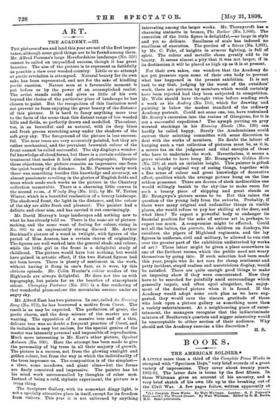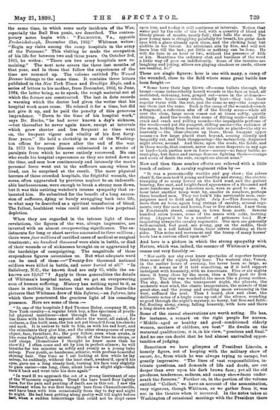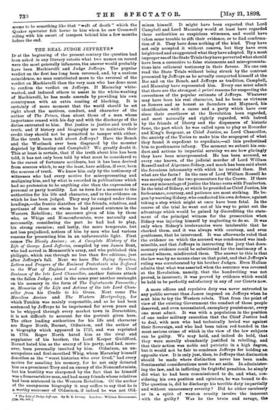BOOKS•
THE AMERICAN SOLDIER.•
A LITTLE more than a third of the Complete Prose Works is occupied with " Specimen Days," very brief records of a great variety of impressions. They cover about twenty years, 1862.82. The latter date is borne by the first fifteen. In these Whitman gives an account of his ancestry, and a very brief sketch of his own life up to the breaking out of the Civil War. A few pages follow, written apparently at
• Complete Prose Works. By Walt Whitman. London G. P. Putnam's Sons.—t2.) The Wound Dresser. By Walt Whitman. Edited by IL M. Macke. M.D. Same publishers.
the same time, in which some early incidents of the War, especially the Bull Run panic, are described. The contem-
porary notes begin with : " FALMOUTH, VA., opposite Fredericksburgh, December 21st, 1862." Whitman writes: "Begin my visits among the camp hospitals in the army
of the Potomac." This visiting he made the occupation of his life for between two and three years. On October 3rd, 1865, he writes : " There are two army hospitals now re- maining." The next note covers the three last months of that year, and in those that follow the experiences of the time are summed up. The volume entitled The Wound Dresser belongs to the same time. It contains three letters published in the New York Times and Brooklyn Eagle, and a series of letters to his mother, from December, 1862, to June, 1864, the latter being, so to speak, the rough material out of which the former are constructed. The last in date records a warning which the doctor had given the writer that his hospital work must cease. He relaxed it for a time, but did not give it up, and he paid the penalty of this generous imprudence. " Down to the time of his hospital work," says Dr. Backe, " he had never known a day's sickness, —but thereafter he never again knew, except at intervals which grew shorter and less frequent as time went on, the buoyant vigour and vitality of his first forty- four years." He held a clerkship in one of the Washing- ton offices for seven years after the end of the war. In 1873 his frequent illnesses culminated in a stroke of paralysis from which he never entirely recovered. No one who reads his hospital experiences as they are noted down at the time, and Bees how continuously and intensely the man's personal force went out to the sufferers among whom he lived, can be surprised at the result. The mere physical horrors of these crowded hospitals, the frightful wounds, the sores, often aggravated by previous neglect to an indescrib- able loathsomeness, were enough to break a str .crig man down, but it was this untiring watcher's intense sympathy that ex- hausted him. He submitted for the benefit of a long succes- sion of sufferers, dying or barely struggling back into life, to what may be described as a spiritual transfusion of blood. The fullest, healthiest veins could not endure this perpetual depletion.
When they are regarded in the intense light of these revelations, the figures of the war, always impressive, are invested with an almost overpowering significance. The en- listments for long or short service amounted to three millions ; there were four millions of certified cases of medical or surgical treatment; six hundred thousand were slain in battle, or died of their wounds or of sicknesses brought on or aggravated by the hardships of campaigning. The magnitude of these stupendous figures astonishes us. But what adequate word can be used of these :—" Twenty-five thousand national soldiers were killed in battle, and never buried at all." " In Salisbury, N.C., the known dead are only 85, while the un- known are 12,027 "10 Apply to these generalities the details of Whitman's hospital notes, and we get an overpowering sum of human suffering. History has nothing equal to it, as there is nothing in literature that matches the Dante-like pictures that Whitman drew of this Inferno,—an Inferno, into which there penetrated the gracious light of his consoling presence. Here are some of them :- " In one of the hospitals I find Thomas Haley, company M, 4th New York cavalry—a regular Irish boy, a fine specimen of youth- ful physical manliness—shot through the lungs He lies there with his frame exposed above the waist, all naked, for coolness, a fine built man, the tan not yet bleach'd from his cheeks and neck. It is useless to talk to him, as with his sad hurt, and the stimulants they give him, and the utter strangeness of every object, face, furniture, he., the poor fellow, even when awake, is like some frighten'd, shy animal. Much of the time he sleeps, or half sleeps. (Sometimes I thought he knew more than he show'd.) I often come and sit by him in perfect silence ; he will breathe for ten minutes as softly and evenly as a young babe asleep. Poor youth, so handsome, athletic, with profuse beautiful shining hair. One time as I sat looking at him while he lay asleep, he suddenly, without the least start, awaken'd, open'd his eyes, gave me a long steady look, turning his face very slightly to gaze easier—one long, clear, silent look—a slight sigh—then turn'd back and went into his doze again."
"In ward H we approach the cot of a young lieutenant of one of the Wisconsin regiments. Tread the bare board floor lightly here, for the pain and panting of death are in this cot. I saw the lieutenant when he was first brought here from Chancelloraville, and have been with him occasionally from day to day and night to night. He had been getting along pretty well till night before Let, when a sudden hemorrhage that could not be stopt came upon him, and to-day it still continues at intervals. Notice that water pail by the side of the bed, with a quantity of blood and bloody pieces of muslin, nearly full ; that tells the story. The poor young man is struggling painfully for breath, his great dark eyes with a glaze already upon them, and the choking faint but audible in his throat. An attendant sits by him, and will not leave him till the last ; yet little or nothing can be done. He will die here in an hour or two, without the presence of kith or kin. Meantime the ordinary chat and business of the ward a little way off goes on indifferently. Some of the inmates are laughing and joking, others are playing checkers or cards, others are reading, &c."
These are single figures; here is one with many, a camp of the wounded, close to the field where some great battle has been fought :—
Some have their legs blown off—some bullets through the breast—some indescribably horrid wounds in the face or head, all mutilated, sickening, torn, gouged out—some in the abdomen— some mere boys—many rebels, badly hurt—they take their regular turns with the rest, just the same as any—the surgeons use them just the same. Such is the camp of the wounded—such a fragment, a reflection afar off of the bloody scene—while all over the clear, large moon comes out at times softly, quietly shining. Amid the woods, that scene of flitting souls—amid the crack and crash and yelling sounds—the impalpable perfume of the woods—and yet the pungent, stifling smoke—the radiance of the moon, looking from heaven at intervals so placid—the sky so heavenly — the clear-obscure up there, those buoyant upper oceans—a few large placid stars beyond, coming silently and languidly out, and then disappearing—the melancholy, draperied night above, around. And there, upon the roads, the fields, and in those woods, that contest, never one more desperate in any age or land—both parties now in force—masses—no fancy battle, no semi-play, but fierce and savage demons fighting there—courage and scorn of death the rule, exceptions almost none."
Now and then these sombre effects are relieved with a little touch of colour. A cavalry regiment rides by :- " It was a pronouncedly warlike and gay show ; the sabres clank'd, the men look'd young and healthy and strong; the electric tramping of so many horses on the hard road, and the gallant bearing, fine seat, and bright-faced appearance of a thousand and more handsome young American men, were so good to see. An hour later another troop went by, smaller in numbers, perhaps three hundred men. They too look'd like serviceable men, cam- paigners used to field and fight. July 3.—This forenoon, for more than an hour, again long strings of cavalry, several regi- ments, very fine men and horses, four or five abreast. I saw them in Fourteenth street, coming in town from north. Several hundred extra horses, some of the mares with colts, trotting along. (Appear'd to be a number of prisoners too.) How inspiriting always the cavalry regiments. Our men are generally well-mounted, feel good, are young, gay on the saddle, their blankets in a roll behind them, their sabres clanking at their sides. This noise and movement and the tramp of many horses' hoofs has a curious effect upon one."
And here is a picture in which the strong sympathy with. Nature, which was, indeed, the essence of Whitman's genius, comes out very forcibly :-
" Nor earth nor sky ever knew spectacles of superber beauty than some of the nights lately here. The western star, Venus, in the earlier hours of evening, has never been so large, so- clear ; it seems as if it told something, as if it held rapport indulgent with humanity, with us Americans. Five or six nights since, it hung close by the moon, then a little past its first quarter. The star was wonderful, the moon like a young mother. The sky, dark blue, the transparent night, the planets, the moderate west wind, the elastic temperature, the miracle of that great star, and the young and swelling moon swimming in the west, suffused the soul. Then I heard, slow and clear, the deliberate notes of a bugle come up out of the silence, sounding so good through the night's mystery, no hurry, but firm and faith- ful, floating along, rising, falling leisurely, with here and there a long-drawn note."
Some of the casual observations-are worth noting. He has, for instance, a remark on the right people for nurses. 0 Middle - aged or healthy and good - conditioned elderly women, mothers of children, are best." He dwells on the maternal qualification; it is, in his view, "precious and final."
And no one can doubt that he had almost unrivalled oppor- tunities of judging.
Sometimes we have glimpses of President Lincoln, a homely figure, out of keeping with the military show of escort, &c., from which he was always trying to escape, but greatly impressive. " The lines of vast responsibilities, in- tricate questions, and demands of life and death, are cut deeper than ever upon his dark brown face; yet all the old goodness, tenderness, sadness, and canny shrewdness under- neath the furrows." Further on, in the portion of the volume entitled " Collect," we have an account of the assassination, very vigorous, though Whitman, as we gather from it, was not in the theatre when it occurred. In the notes taken ai Washington of occasional meetings with the President there seems to be something like that "waft of death" which the Quaker spectator felt borne to him when he saw Cromwell riding with his escort of troopers behind him a few months before the end.




































 Previous page
Previous page